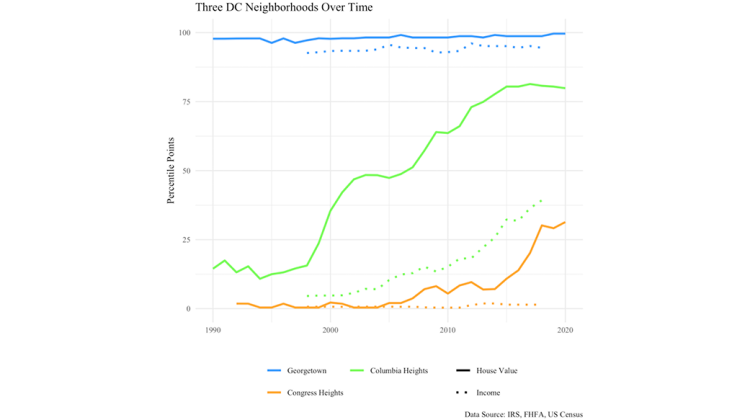Remeasuring Gentrification

Credit: Authors, Data Source: IRS, FHFA, US Census
For urban planners and designers, gentrification is a specter that looms over new ideas and interventions in a city. Will the conversion of roadway into a pedestrian focused route cause new, higher income residents to flock to a neighborhood, displacing and pricing out traditional residents? Yet, for all the discussion and study of gentrification, the metrics by which we measure and understand the capital reinvestment, landscape change, and displacement of low-income groups are varied and rely upon variables that are “often vague or arbitrary.” Worse, most such variables are only released many years later–painting a picture of gentrification that is already outdated. Could a new, systematic approach to measuring gentrification help us understand the causes and consequences to help mitigate or reduce negative externalities?
In a new paper for Urban Studies, a team of researchers proposes a classification of metrics that account for future expectations of current conditions of a neighborhood. “By contrasting variables that do reflect expectations to variables that do not, we show that property values are expectations-based. That is to say, prices are generated by transactions involving market participants who make and apply assessments of the neighborhood’s future when transacting,” said lead author of the paper, devin michelle bunten.
The paper, “Re-measuring gentrification,” utilizes four case studies: the Boston region, Chicago, Portland, and Los Angeles to demonstrate how expectations-based signal improves understanding and in turn provide a more accurate tool for practitioners and researchers to track and design policies to mitigate negative effects of gentrification.
Additional authors include DUSP’s Benjamin Preis and Stanford University’s Shifrah Aron-Dine. bunten is an Assistant Professor of Urban Economics and Housing. She is a teacher, writer, and urban economic theorist. Their research uses economic theory and empirical tools to study a range of urban topics, including gentrification and neighborhood change, restrictive zoning, and the white supremacy at the root of American housing. Preis’ (PhD ‘23, MCP ‘19) research focuses on the relationship between the rental housing market and inequality in US cities. He is particularly concerned with how a changing rental market produces inequality and opportunities for extraction and exploitation. Aron-Dine’s research focuses on environmental economics, macroeconomics, and finance.


